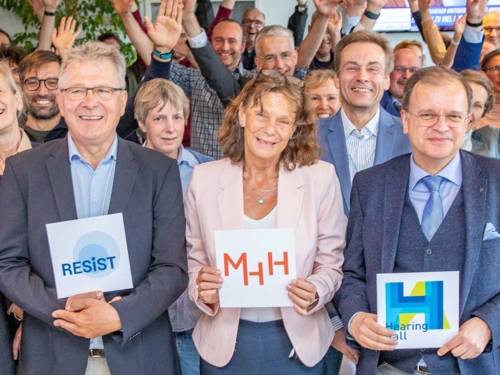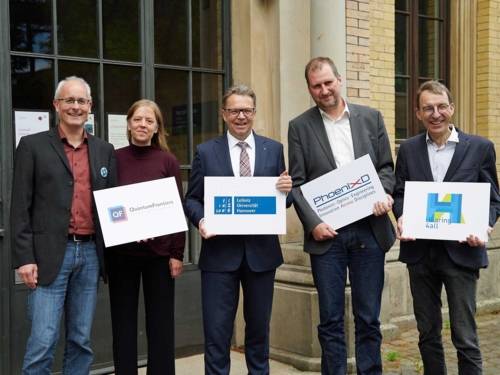Remarkable success for hanover's universities
A total of four clusters of excellence have been approved at Leibniz University and the Medical School, each of which will receive one million euros in funding for seven years starting in January 2026.
In the current competition round, four clusters of excellence involving Leibniz University Hannover (LUH) and Hannover Medical School (MHH) were selected for funding. The decision was made on the basis of a science-led review process by the Excellence Commission. The selected clusters will start receiving funding on 1 January 2026.
Selected clusters of excellence at LUH and MHH
- Hearing4All – University of Hannover, Hannover Medical School, University of Oldenburg
- PhoenixD – University of Hannover
- QuantumFrontiers – University of Hannover, TU Braunschweig
- RESIST – Hannover Medical School
The Excellence Strategy of the Federal Government and the Länder is the most important research funding programme in Germany. It supports clusters of excellence – thematically focused, internationally competitive research networks – at universities. The aim is to increase the international visibility of Germany as a centre of science and to support structural developments at universities.
RESIST: Tailored strategies against infectious diseases
The RESIST team is working towards the goal of better understanding individual susceptibility to infections in order to be able to prevent, diagnose and treat infections in a tailored manner. ‘Further funding for our research will provide important long-term help for people who are particularly vulnerable to infections. These include newborns, senior citizens and people whose immune systems are suppressed for therapeutic reasons,’ says RESIST spokesperson Prof. Dr. Reinhold Förster.
The RESIST team has already achieved numerous research successes. These relate, for example, to sepsis (blood poisoning) in newborns, SARS-CoV-2 vaccination and strategies against multi-resistant hospital germs. For the new funding period, the team has realigned and restructured its previous topics and highlighted further focal points and future plans, such as new infection models and organoids – three-dimensional models that mimic human organs. In addition, machine learning and artificial intelligence are to be used more extensively in data analysis and integration.
Hearing4all: Leading position in hearing research further expanded
The Hearing4all cluster continues its success story in hearing loss research. Under the motto ‘Hearing4all.connects’, the research network of the University of Oldenburg, the MHH and Leibniz University Hannover is expanding its focus. The researchers are investigating genetic approaches to prognosis and therapy, developing AI systems to distinguish between sound sources, and working on hearing aids as ‘health centres for the ear.’ The focus is on real-life situations, taking into account multilingualism, everyday life, and social interactions. The network combines medical, scientific, and technical disciplines. ‘The funding from the DFG is a strong signal of the relevance of our research and a great vote of confidence in our concept,’ says Prof. Dr. Dr. Andrej Kral (MHH). ‘Our goal is to develop innovative therapies that not only alleviate symptoms but also specifically address the causes of hearing disorders.’
PhoenixD: Photonics, Optics, Engineering Innovation – Across Dimensions
The PhoenixD Cluster of Excellence is entering its second funding round. The aim is to develop high-precision optical devices quickly and cost-effectively in order to enable novel applications in medical diagnostics, food production, telecommunications and quantum communication. To this end, scientists from six disciplines – mechanical engineering, physics, electrical engineering, computer science, mathematics and chemistry – are working together to research the manipulation and detection of laser light.
In recent years, an ecosystem for optics and photonics research has developed in Hanover, which will establish its own optics campus in Marienwerder with the Laser Zentrum Hannover e. V. and the OPTICUM research building currently under construction.
"Over the past seven years, we at PhoenixD, with around 150 scientists, have published a large number of innovative research results that would not have been possible without the interdisciplinary collaboration under the umbrella of the cluster. The seal of excellence now awarded with the grant belongs above all to our young scientists, who have done outstanding research work. The fact that we were selected as the only photonics cluster in Germany underlines our special position in this future technology," says PhoenixD spokesperson Prof. Dr. Uwe Morgner from LUH. ‘The approval is a great confirmation of our development work. Over the next seven years, we will expand the competence network and appoint further top international researchers to Lower Saxony.’
In addition to Leibniz University Hannover, the research network also includes the Technical University of Braunschweig, the Laser Zentrum Hannover e. V., the Max Planck Institute for Gravitational Physics (Albert Einstein Institute) and the Physikalisch-Technische Bundesanstalt.
QuantumFrontiers: Pushing the boundaries of what can be measured
The QuantumFrontiers Cluster of Excellence is entering its second funding phase. Its central goal is to carry out measurements at the quantum limit with unprecedented precision – and to advance both basic research and applications in quantum technology. During its lifetime to date, QuantumFrontiers has achieved outstanding results, establishing itself as a leader in the international research landscape and building a state-of-the-art infrastructure.
‘To measure is to know – QuantumFrontiers is pushing the boundaries at the heart of the natural sciences. After all, accurate measurements are crucial for any progress in physics and technology,’ says cluster spokesperson Prof. Dr. Silke Ospelkaus from LUH, explaining: ‘With quantum metrology, we are venturing into uncharted territory and achieving unprecedented precision. We have built QuantumFrontiers into a globally unique centre in this field. And this is only the beginning: over the next seven years, together with our partners, we will continue to push the boundaries of what can be measured and have a lasting impact on science and society.’
QuantumFrontiers is developing next-generation atomic interferometers, optical clocks and gravitational wave detectors. These systems are driving forward the search for unknown forces, dark energy and dark matter. Previously undetectable astrophysical events from the early days of the universe can now be traced. Highly precise Earth observation and robust, efficient sensors allow conclusions to be drawn, for example, about changes in the water cycle and other processes relevant to the environment and climate.
The cluster brings together researchers from the fields of physics, engineering, computer science, social sciences and education. The spokesperson is based at LUH, with participation from TU Braunschweig, the Physikalisch-Technische Bundesanstalt, the Laser Zentrum Hannover e. V., the Centre for Applied Space Technology and Microgravity, the DLR Institute of Satellite Geodesy and Inertial Sensors, and the Max Planck Institute for Gravitational Physics (Albert Einstein Institute).
Applications as a University of Excellence
With the approval of the clusters of excellence, LUH and MHH have also cleared the hurdle of being able to apply as a University of Excellence – two funded clusters are required for this. Both universities have announced that they will apply for funding as a University of Excellence. The application must be submitted to the German Research Foundation by November 2025. Between April and June 2026, the experts will visit Hanover to assess the sites. The decision will be made at the end of September 2026.
(Published: 23 May 2025)


